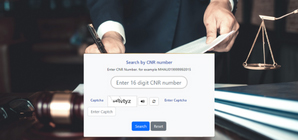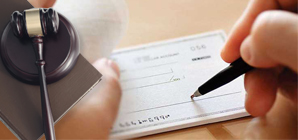All you need to know about cheque bounce
Posted On : February 20, 2020

Table of Contents
Cheque bounce is one of the most common problem people face these days. What is cheque bounce? When does cheque bounce happens? What are the reasons for cheque bounce? How to deal with that?
These are the common queries people have regarding cheque bounce. In this blog, I shall discuss all the topics related to cheque bounce and how to deal with that.
WHAT IS CHEQUE BOUNCE?
Before that we need to know what is actually a cheque? A cheque is basically a bill of exchange drawn upon a designated banker which is payable only when it is demanded by the applicant.
Cheque bounce which is also known as dishonour of cheque is a basically failure of payment by the drawer towards the drawee or say it is an unpaid cheque returned back by the bank due to some or the other reasons.
WHAT ARE THE REASONS FOR CHEQUE BOUNCE?
There are various reasons a cheque can bounce. Following are the reasons for cheque bounce:-
- The signature on the cheque and the signature on the official documents like passbook, etc are different.
- Overwriting on the cheque can also be a problem if it is clearly visible.
- Cheque presented after the expiry of time period i.e. 3 months
- By any chance the bank account has been closed by the account holder or by the bank itself.
- Opening balance is insufficient
- Insufficient funds in the account of the drawer.
- The payment has been stopped by the drawer himself
- Inconsistency in the figures written on the cheque.
- Inconsistency in the amount number on the cheque.
- If the stamp of the company presenting the cheque is missing.
- In case the cheque is presented from a joint account and the signature of any of the account holder is missing.
- Any of the person i.e. the drawer or the drawee has died.
- By any chance the drawer has turned insolvent.
- Signs of insanity found in the drawer.
- Any alterations found in the cheque.
- Cheque issued against the rules of trust.
- The bank doubts the authenticity of the cheque.
- The cheque has been presented at the wrong branch by the drawee.
- The amount mentioned in the cheque crosses the limit of the cheque overdraft.
Thus, above mentioned are the situations where a cheque issued can bounce due to some minor problems and hence can create a problem for both the drawer and the drawee.
Well, every problem comes with a solution. Thereby we will discuss about the solutions and how to deal with cheque bounce cases
CHEQUE BOUNCE CASE- WHAT AND HOW TO DEAL WITH THE PROBLEM?
According to Section 138 of the Negotiable Instrument Act, 1881 cheque bounce is a criminal offence. Nevertheless, the aggrieved party in such cases can file both the criminal as well as a civil suit against the accused.
Below mentioned are the actions one can take for a cheque bounce case:-
Resubmission of the Cheque
After being aware of the bounced cheque, the issuer of the cheque gets another chance to correct the error which caused the cheque bounce and can ask the payee to resubmit the cheque for clearance provided it is done within the time frame which is 3 months from the date of cheque bounce.
Demand Notice
By any chance if the cheque happens to bounce for the second time the recipient of the cheque opts to send a demand notice to the issuer of the cheque asking to transfer the required amount within the next 15 days. Also, the demand notice is sent within 30 days of receiving the notice of bounced cheque from the bank.
Filing a Complaint
Even after sending a demand notice there is no response from the issuer of the cheque then the drawee can file a complaint before the court within 30 days. You can also file a case after 30 days if you can provide a reasonable justification for the delay and the magistrate finds the reason justifiable enough. Keep in mind the court must be situated in a location where the cheque was presented or returned by the bank.
The case can be filed under Section 138 of the Negotiable Instrument Act, making sure that the cheque issued as a gift cannot be covered by under such section.
Moreover, for seeking remedies the recipient of bounced cheques can also file a complaint about cheating under Section 420 of the Indian Penal Code.
Civil Complaint
If filed a complaint regarding bounced cheques the issuer gets the punishment in terms of jail but in most cases does not let the recipient get his dues. Thus, it is advisable for the recipient if the bounced cheque to file a separate civil suit for the recovery of the amount he is supposed to get.
Cheque Bounce Penalty
After receiving the complaint along with relevant papers and affidavit the court shall issue summons and hear the matter. If found guilty then the defaulter shall be punished with imprisonment for a term of two years or more or monetary penalty which can be twice the amount of the cheque or both. Also, the bank has the right to cease the cheque book facilities and close the account for repeated offences of cheque bounce.
Consult Lawyer for Cheque Bounce Matter
























